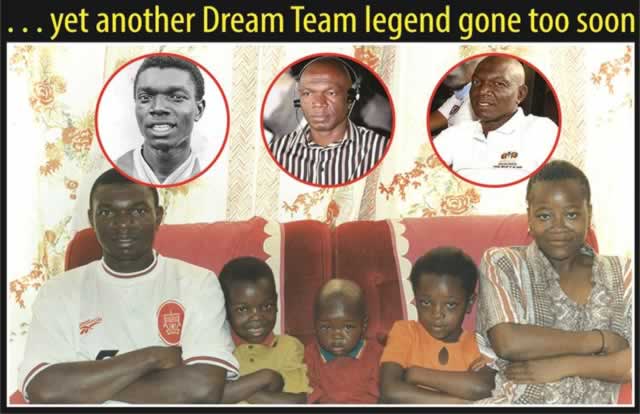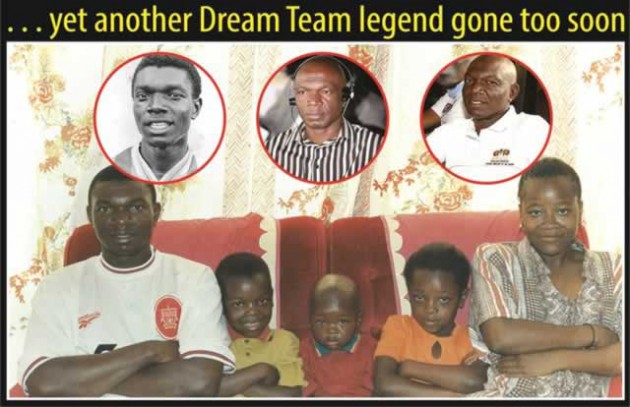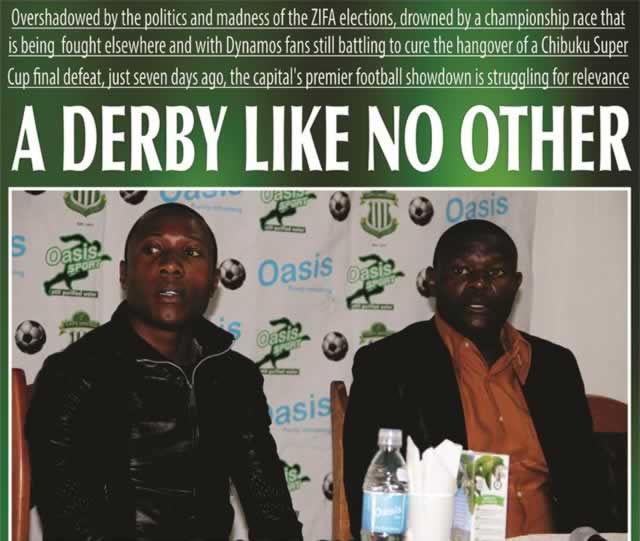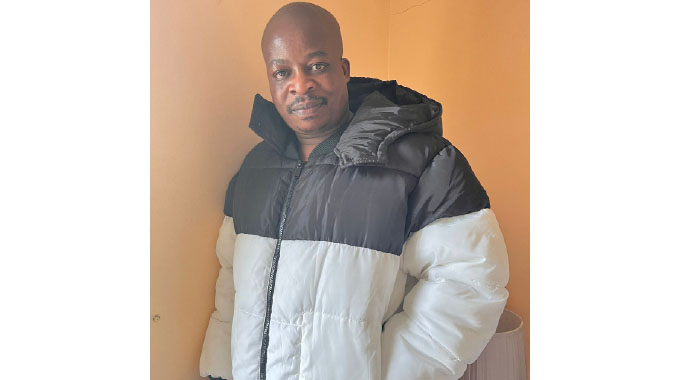OUR STEELY WARRIOR

 Sharuko on Saturday
Sharuko on Saturday
PAUL GUNDANI did not have the poster boy appearance of Peter Ndlovu, or the striking boyish looks of Benjamin Nkonjera, but his raw power and incredible athleticism, was a dynamic package that made his football so beautiful it swept him into the hearts of millions of fans who saw him dance on a football field.
He exploded on the big stage, as the latest gem from a productive Midlands nursery that had given Zimbabwe football some of her toughest, and smartest, defenders — with Ephraim Dzimbiri and James Takavada having led the way — with the latter even scaling the dizzy heights of winning the Soccer Star of the Year in 1984.
Another tough defensive pillar, based just 72km away from Takavada’s base in Kwekwe, Ephert Lungu, had been crowned Soccer Star of the Year in 1983, for his starring role in John Rugg’s ultra-tough Rio Tinto team, which pushed Dynamos all the way in a riveting championship race that year, only to lose the battle on goal difference.
On that little golden belt of defensive mastery, where you also found defenders who were so big and tough they were even nicknamed “Chimamuna”, the Nyanja word for “Chimurume”, the indomitable Abraham Mwanza, Gundani emerged to join the bandwagon in a journey that would see them embrace the responsibility of fighting for this country on the football fields.
And, at the age of just 17, while still at Drake High School in Kwekwe, he forced his way into a very competitive Ziscosteel team, at a time when the domestic Premiership was a theatre reserved for only the very best of the country’s footballers.
Men like his old friend, and defensive partner, Newman Bizerk, who — if he had played today — would have been a superstar who overshadowed everyone else they would have crowned him the Soccer Star of the Year, midway this season, an endorsement that he was cut from a different cloth from what we are seeing now.
Men like Barnabas Likombola, boy oh boy, the starring role he used to play, again and again, in a powerful Rio Tinto team loaded with such talents like the immortal Joseph Zulu, the incredible David “Chikwama” Mwanza, the sensational Robert Godoka and, of course, Victor Mapanda, and how we used, as kids from the surrounding areas, simply loved the fact that these superstars were our own, part of our extended family.
In those wild days of my innocence, in the ‘80s when my late father used to regularly take me to Cam and Motor Mine Stadium to watch the best of the domestic Premiership, when supporting Rio Tinto was something that came just naturally unless, of course, on the rare occasions they played our beloved Falcon Gold in the Chamber of Mines battles, I was exposed — at an early age — to the virtues, and importance, of defence in football.
And that is why it was easy, for me, to appreciate the pedigree of good defenders, when they came along, when a lot of people, wooed by the artistry of those who roam the advanced parts of this game, the midfielder and strikers, appeared to have little time to understand, let alone see value, in those whose job was primarily to provide cover.
Anyone can be a defender, some of my old friends used to say at school, because you don’t need any special qualities to mark an opponent, but you really need to be talented to be a midfielder, where they said all the thinking was done, and to be a striker, knowing when to escape the one who was overshadowing you and finding the accuracy, either with the head or foot, to beat the ‘keeper.
Having grown up with defenders who were artists, I used to argue otherwise, the fact that more often than not I lost the argument, overwhelmed by the sheer numbers of those on the opposite divide of the debate matters little now but, crucially, it didn’t make me change my view that there was value in all the departments of a team.
And, it was such appreciation of defence as a virtue, which made me see that Paul Gundani was a special footballer, a player who was destined for greatness, and — when life brought us together again during the hey days of the Dream Team — I was surprised that he had come so far in his career.
THE STAR WHO LIVED IN THE SHADOWS OF A MAN CALLED RAMBO
It’s true that Paul Gundani lived in the shadow of the immortal Rambo of Zimbabwe football, Mercedes Sibanda, and — like all the excellent world-class golfers unlucky to have emerged at the time when a certain Tiger Woods was at the peak of his athletic prowess — he won’t get as much appreciation, for the superstar that he was, because all the headlines, more often than not, were being generated elsewhere.
It’s like playing in the CAPS United midfield of the ‘80s, when all the headlines were dominated by The Headmaster, Joel “Jubilee” Shambo, a rare genius, or in the Black Rhinos’ midfield of the ‘80s, when all the headlines were dominated by Stanford “Stix” Mtizwa, a true genius, or playing in the Dynamos attack during that time when, everything revolved on the mood, and brilliance, of Moses Chunga, a talent so unique he still calls himself, as with some justification, ‘The Greatest.’
Because Paul Gundani lived in the shadows of the great Rambo, very few fans, and even local football writers, know that he was so good he made the grade at English side, Stockport County, at a time when this club based in the football hotbed of Manchester, just 11 km either side of Old Trafford or the Etihad Stadium, in the ‘90s.
Back then, Stockport County were a rising football team, at one stage even playing in a league higher than Manchester City, good enough to beat Everton 3-2 in an FA Cup replay and also reach the semi-finals of the League Cup, and spending five seasons in the old First Division.
Gundani even featured for the club’s reserves, on a number of occasions, before his dreams of playing football in Europe were shattered when the British Home Office refused to give him a work permit saying that doing so would destroy the chances of homegrown players.
And the fact that he was regularly called for the Dream Team, during that period, complicated issues given that he did not get enough game time needed, for his prospective employers to use video evidence, to appeal that he was a special talent that needed to be treated in a special way.
That was before the doors into English football, in particular, and European football, in general, had been swung as wide open, for African players, as is the case right now, and when only the very, very best, were given the right to work there.
But, even though he only featured in a number of reserve games, the fans of Stockport County haven’t forgotten Gundani, more than 20 years later, and this week, upon hearing that he had died, they remembered him on various online sites, dedicated to the team, including the ‘Go, Go, Go County’ website, which is dedicated to preserving every historical aspect of the journey the club has travelled so far.
“If asked to name the second County player capped at full international level the name people normally give, if they have any idea at all, is that of Paul Jones,” an article, dedicated to their short but unforgettable dance with Gundani, screamed on the website this week.
“Some might mention Ernie Simms who played for the Football Association on an Australian tour alongside County’s first full international player Harry Hardy. However, reading some old County programmes recently I came across a man missing from the club’s Role of Honour.
“Paul Gundani came to County on an extended trial early in November 1992. He had established a good reputation as a defender with a club in his Zimbabwean homeland called Ziscosteel in the late ‘80s and early ‘90s. Gundani turned out several times for the Reserve side in the Midland Senior League over the next four or five months without getting a first team chance due to the lack of a work permit.
“The Department of Employment had given its verdict on the club’s application for a work permit. They stated that Gundani would be depriving homegrown players of a job, and turned down the club’s application. The line-ups for Internationals in Africa are not easy to trace and it may well be that Paul made additional appearances in his spell at County with Zimbabwe in action at least three more times.
“Paul was regularly absent during his time in a County shirt when called back for international matches by Zimbabwe. Gundani was a regular in the Zimbabwean full international side – know as the Warriors – after making the step up from Under-20 level.
“At one time, they went 13 African Cup of Nations and World Cup qualifiers unbeaten under current Barbados coach Reinhard Fabisch. The squad that humbled such African football giants as Cameroon, Egypt and Angola included the more well-known names to English football fans of Bruce Grobbelaar and Peter Ndlovu. It is widely regarded as the best national soccer team ever assembled in Zimbabwe.
“Their dreams were unfulfilled in the long run, as they faltered in the late stages of their qualifying competitions and failed to make it to the African or World Cup finals.”
As Paul Gundani watches us today, from somewhere in heaven, having taken his place among some of his Dream Teammates who departed before him, including Rambo, Nkonjera, Willard Mashinkila-Khumalo, Adamski and Francis Shonhayi, he would be right to wonder why — given the talent that God gave him and how he served his country well — he wasn’t given the recognition, even in death, which his teammates got.
But, then, he is in good company.
For our Lord Jesus Christ will tell him that we, the living, are just descendants of those people who asked Him “Is not this the carpenter, the son of Mary, and brother of James and Joses and Judas and Simon? Are not His sisters here with us?” more than 2000 years ago, and how they took offence at Him.
And, then, Jesus said to them, “A prophet is not without honour except in his hometown and among his own relatives and in his own household.”
Maybe, that’s how it was meant to be for Paul Gundani, the star who will always live in the shadows, and it might be more than just a coincidence that, when the chance came for him to move to Europe, he arrived at Stockport County, the team that will always be overshadowed by the wealth, appeal and success of their Manchester neighbours – United and City.
IT’S RIDICULOUS THAT A MAN SO TALENTED WILL ONLY BE REMEMBERED FOR ONE MOMENT
Reading through all the reports in newspapers, which announced Paul Gundani’s death, and the follow-up articles, I found it irritating that those who authored them appeared transfixed with remembering this genius just for one moment in the colours of the Warriors.
Virtually all the reports appeared to zoom on that unforgettable moment, at the National Sports Stadium, on January 22, 1995, in a ’96 Nations Cup qualifier, as Reinhard Fabisch’s era of the Dream Team melted to a close, when Gundani scored a wonder goal in the colours of his nation.
The goal arrived shortly after the break when the rampaging defender fired home from range, the ball swerving viciously, and arrowing into the nets, to double our lead after the star of that show, Vitalis Takawira, had given us a 12th minute lead against Cameroon.
Vitalis would strike again, in the 50th and 89th minutes, to complete a hattrick and that we had whipped Cameroon 4-1, just a few months after the Indomitable Lions had robbed us of a deserved ticket to the ’94 World Cup finals with that controversial win in Yaounde, which made Fabisch so furious he lost his mind and tossed US dollar notes on the referees, to suggest that they had been bribed to ensure we lose, provided some consolation.
Of course, the headlines that day were all about Vitalis, which is fair for a man who gets a hat-trick against such a powerful team on the continent, but there was something special about Gundani’s goal, coming from a defender, it needed more, in terms of coverage, and appreciation.
However, to remember him as that Warrior who scored that wonder goal that day would be an insult to what he gave to our football, an insult to his memory as a rare breed of footballer who deserves more, in terms of appreciation, because he was not a one-shot wonder.
Today, we will bury Paul Gundani, in the town that he always called home, but what he did, on the pitch and, later in life, as a fearless representative of our players who was there for them when others wanted to end their careers because of trumped-up charges, will never be swept away by the fact that, physically, he won’t be with us anymore.
The irony of all this is we are saying goodbye to one of those few former players who, in the past few years, has invested so much in turning himself into an administrator of our national game, on a day when a decision will be made to decide who are the gentlemen who will lead our football after December 5.
And, so his funeral in Kwekwe today, will be overshadowed by events from the boardroom with the headlines dominated by who might be disqualified, or given the green light, to battle for the ZIFA leadership.
Maybe, that’s how it was meant to be for Paul Gundani, the star who always lived in the shadows and, even in death, finds himself overshadowed by events elsewhere.
To God Be The Glory!
Come on United!!!!!!!!!!!!!!!!!!!!!!!!!!!!!!!!!!!!!!!!!!!
Text Feedback — 0772545199
WhatsApp Messenger – 0772545199
Email — [email protected]
Skype — sharuko58
Chat with me on Facebook, follow me on Twitter @Chakariboy, interact with me on Viber and on ZBC’s weekly television football magazine programme, GamePlan, on Monday nights, or read my material in The Southern Times.










Comments